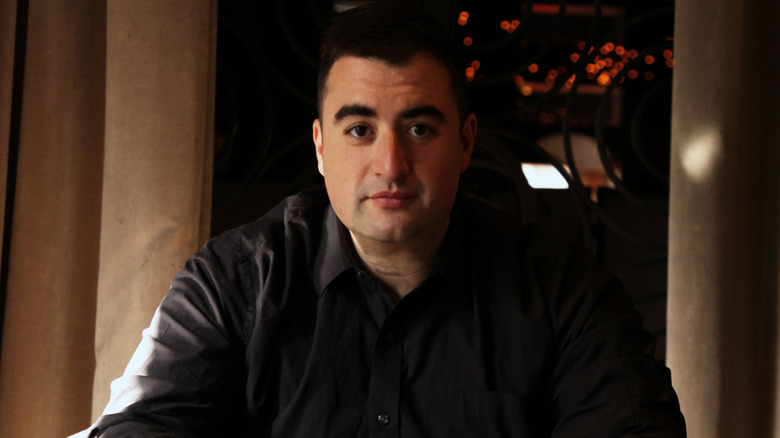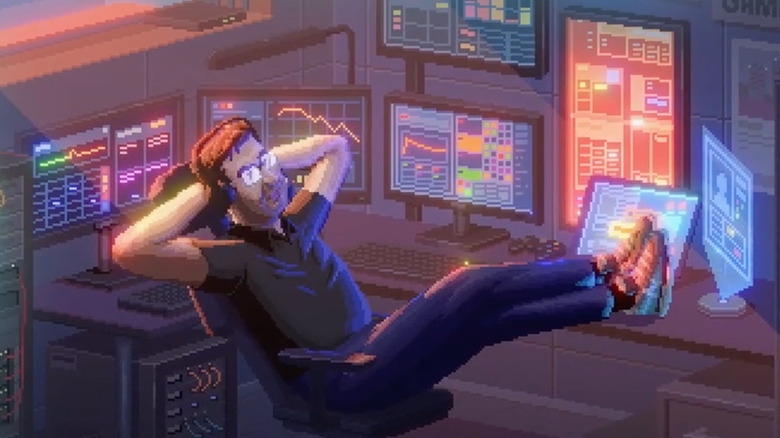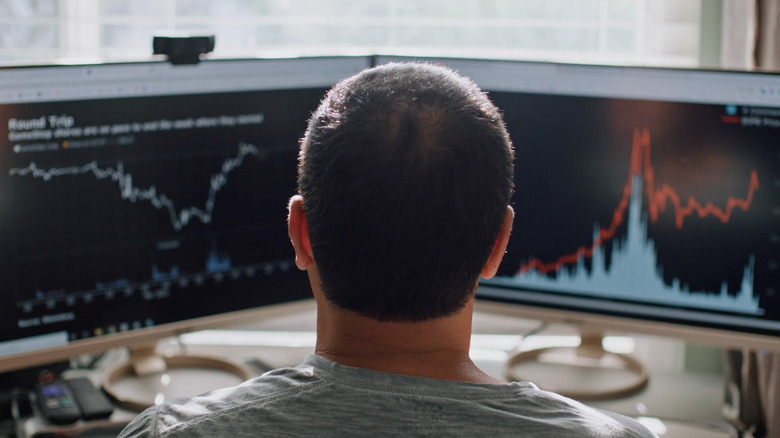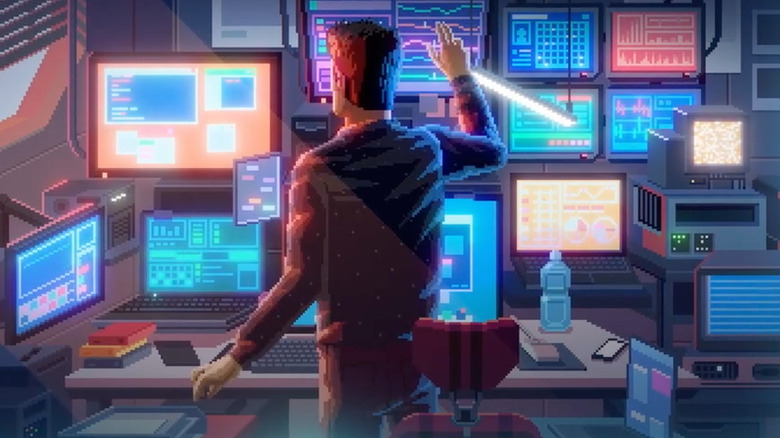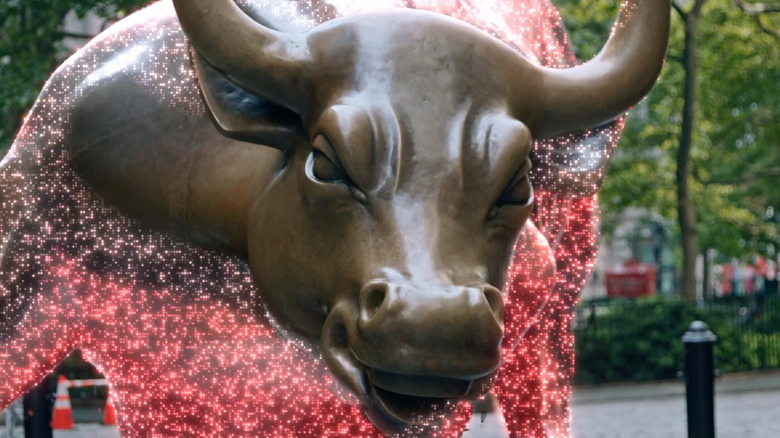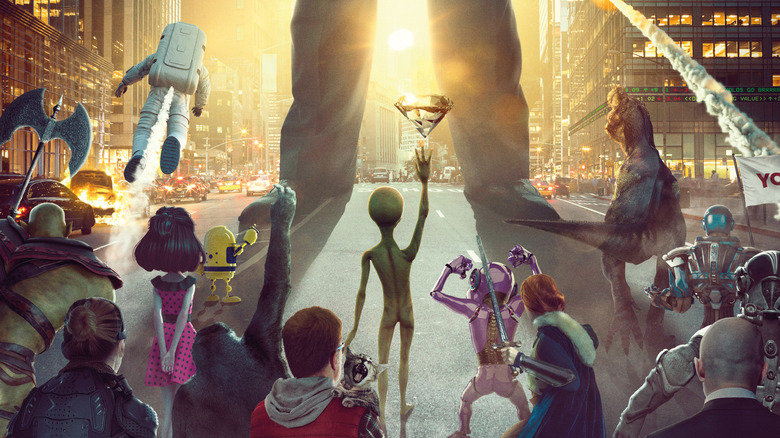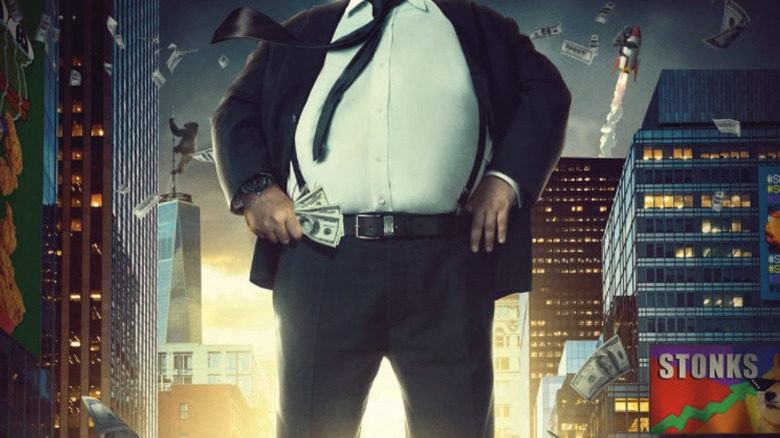GameStop: Rise Of The Players' Jonah Tulis And Blake Harris Talk About Taking On Hedge Funds With The Power Of Friendship [Interview]
In 2021, retail investors pulled off something that was considered impossible: They challenged hedge funds over the value of a struggling stock and won — big time. When a hedge fund targeted GameStop for short selling, a ragtag group of investors (following the lead of a small band of steadfast stock advocates) rallied behind the stock, gaining collective millions against billions in losses from the financial powers that be. In the new documentary "GameStop: Rise of the Players," the team behind "Console Wars" tells the story of this exercise in retail investor revenge. It's a charmingly told story of the first people who boarded the GameStop stock train, miraculously made in only seven months despite the pandemic and the lightning speed of this most unusual Wall Street event.
I spoke with director Jonah Tulis and producer Blake Harris (who, full disclosure, has written for /Film in the past) about the project, the colorful folks at the story's heart, and whether or not we may see this sort of investor uprising again in the future.
"Underdog stories are the best stories."
This interview has been edited for clarity and brevity.
This and "Console Wars" are centered in different industries, but both are clearly underdog stories. Why do you keep coming back to those types of tales?
Tulis: Underdog stories are the best stories. They're people who do something extraordinary and take on the big guy, and when they win, it's that much more satisfying. When David beats Goliath, it's a hell of a lot more satisfying than when one Goliath beats another Goliath. I think there's something about the underdog that ... those subjects and characters are the ones that speak to us because we're all underdogs in some way or another. I think, in the film industry, for a long time we were underdogs, and we still are, to some extent. I think there's something about an underdog you can really believe in and hop on board.
Harris: Definitely. One, I see ourselves as underdogs because we both have wanted to be writers and filmmakers for so long and didn't have any connections, and it's a tough industry, of course. Two, I think that something Jonah and I always do, that I'm very proud that we do, is that we go into all of our stories without a preconceived agenda and we really just try to let our characters tell us where to go. I mention all that because I think that everyone sees themselves as an underdog. I think even Donald Trump Jr., sees himself as an underdog. When we're telling it through the eyes of these characters, there's an underdog aspect.
The last thing is that, and this is something we've hopefully achieved with both of our films, as much as they are about [or] set in the tech world, or the gaming world, or the financial world, we always want our films to be accessible and entertaining to anyone. We always joke that my grandma should be able to enjoy it. I think that's one way, to create a universal story that my grandma could enjoy, because she doesn't care about investing but she'll care about these underdog investors who are trying to stick it to the man.
Tulis: Yeah, we always said with "Console Wars," "if this was a story about a tissue company, it would be just as compelling." Imagine if Tom Kalinske ran a tissue company, and he went down to Walmart and gave out tissues to everybody rather than setting up a video game stand across the street. It would be a similar type of vibe. It would be like "We've got to take on, Kleenex! We're going to take them down!"
Harris: I guess one other thing, Jonah, that you and I talk about is that there's a lot of great documentaries out there that are very serious and they should be very serious. And if you turn on the news, there's a lot of very serious things, and it should be serious because these are serious times. But we also want to talk about the fun, inspiring side of what's going on in the world. I think [that] gets lost too often, and I think telling underdog stories is a great way to capture that.
Tulis: It's very important to tell those documentaries about genocide and those [similar] things, but we've always been drawn to taking these fun, unique stories. I actually think that the way the documentary world is driving right now is because there are these documentaries that bring you in in a different way than they did, say, five or 10 or 15 years ago.
"These were just nice, wonderful people obsessed with something in a way that made them thrive."
So, why tell this particular story? Why did the GameStop story grab you?
Tulis: I had followed it a little bit. I'd seen it on other people's Instagram's, friends of mine, for about a year or two. They would be talking about it on Stories and Twitter and I never really thought too much of it. Then one of my friends basically said, "Hey, I love 'Console Wars,' you've got to do the GameStop doc," and this is before the squeeze happened, or before that whole series of events with Robinhood, everything. With GameStop, it's a business story, but it's a different kind of story. "I don't why you think of me for this, but let me look into it." He says, "You got to talk to this person, and talk to this person ..."
We started investigating it, and I'm talking to people as this [whole] thing is happening and I'm getting their reactions right away. I was thrust into this group of people who I think of as the originators, these are the people who are the original Roaring Kitty, the stream people. These are people who in 2019 were writing about this, and writing about the value of GameStop. People who, now, are the influencers of this world. You have Justin Dopierala at Domo Capital. You have Rod Alzmann, you have Dmitriy Kozin, and then one of the more famous ones in the GME short squeeze who made his name over a year before the actual squeeze, and he was unknown but he sort of unmasked in our movie. I started to meet these people and it was like "The Big Short," except if everybody who believed in the housing crisis was already talking on the internet and sharing their information. I was like, "This is cool."
Harris: And then the key detail, just to pat Jonah on the back, he's really the shepherd of this project. We're partners, but this project began and lives with him. It was like "The Big Short" in a time when people still thought it was a housing boom. When Jonah was telling me and other people at this time, and I like to think I was receptive, but people were, "No, you should not be spending your time talking to GameStop investors, it's a silly company." So he got in and got to know these people, and thank God he did.
Tulis: Yeah. It's kind of nuts because the one thing that attracted me to it was, everything you were hearing in the news was 'WallStreetBets, WallStreetBets, WallStreetBets,' and that was a big part of it. But you've got to remember, some of our subjects were getting kicked off of WallStreetBets a few months prior for talking about it. A lot of the research that they used was from our subjects, but this was a revolution that started with this origin story. And then it took hold on Reddit, Reddit really ran with it, and the news media was blaming Reddit. They were saying, "Oh, oh, these guys are controlling the market," and I'm telling you, there were SEC investigations about Reddit controlling the market. It was a crazy, crazy thing. Meanwhile, there were these other people who saw value in this stock, and were the ones giving the information that everybody was running with, that I was so fascinated by. Honestly, you saw the movie, this is no joke, these are just nice, wonderful people who were obsessed with something in a way that made them thrive.
"We can use our shares as weapons against Wall Street."
I did find the media coverage funny for blaming them as "market manipulators" while major hedge funds and investment firms were actually trying to intervene in normal market activity.
Harris: What was also funny about it, even in the aftermath, you see Keith Gilbert and Roaring Kitty ... that he was brought to Congress and some of these potential lawsuits and some of our characters, in the aftermath of the film, were questioned by the SEC. They're doing things that, at worst, were 1/50th of what the hedge funds were doing. But there's always got to be a scapegoat.
Yeah, exactly. "How dare you anger the Great and Powerful Oz!"
Tulis: But at the end, it's funny — you talk to the hedge fund guys and obviously certain people aren't going to talk to you, but it's not that they're trying to destroy the little guy and trying to ruin the world. They're just trying to make money, and [sarcastically] yeah, if they run over some people, fine. They're trying to make money, and they're trying to make more money, and they're trying to make more money. That's what they care about. And the people I've talked to find this whole thing funny, but I do think it's the beginning of this new world order.
Harris: [laughs] Well, don't use the phrase New World Order, but also I think it's what Jeff said, too. Part of what I was struck by when we were making the film, and as I really started to get to know the story and as we were discussing it, was that there's that line in the opening, and it's in the trailer, where Jen Cruzer says, "We can use our shares as weapons against Wall Street." In this context it's to make money, but really it's about [how] there's no certain future out there, and hedge funds want to be one way, where there's no GameStop and AMC because they want to make money. And that's understandable. But there's a lot of people, like us, that want there to be theaters and want there to be GameStops. I like walking to GameStop, and everyone in our story, whether they were gamers or not, they liked the idea of there being GameStops, whether it's Justin taking his kids there, or Joe having childhood experiences there. And so this idea of using money as a voice, I like that aspect of it.
Tulis: If you think back to the '50s and the '60s and the '70s, our parents and grandparents invested in companies they believed in. And, weirdly, it's much different in this economy, but it is sort of a similar thing. They're investing in these companies that they believe in and care about, and there's something to be said for that, because why not put your money behind the things you believe in?
"I do worry somewhat that there are going to be bag holders here in the situation."
All of these people that started this are "true believers" in a sense, holding on to it against all external, official pundits telling them it's a bad idea. What do you think drives that ethos, to just pick something and ride it out?
Harris: That's a great question. There's a lot of answers to it. I think one thing Jonah and I talked about a lot was that we saw this very much as a COVID film, that the story wouldn't have happened during a different time. And the friendships that formed wouldn't have formed if people didn't have six hours, three days a week to spend on the Roaring Kitty chatter, which is important. And there's a little line in the movie, where Jeff Tarzia says that he wouldn't have stayed with GameStop if he hadn't been making all these videos, and this almost self-imposed peer pressure or this we're-in-it-together mentality. So I think that is a part of it and gets to the psychology of it. That's the tip of the iceberg.
Tulis: In the reality though, in 2019 when Justin wrote his article that said "I think there's value here" and it was two or three dollars [a share], I think as a smart investor he's like "Oh, wow, the value here and the cash they have on hand, maybe you can get to eight or 10 dollars, and you're tripling or quadrupling your investment, and that's a great investment." I think then it started to take hold a bit more as Ryan Cohen came on, and it was "Oh, wait a second, there's a whole transformation happening here." This wasn't prophetic — it wasn't in 2019 they said, "There's going to be a squeeze in 2021" — it's more that they discovered this thing they loved that had value, and then this story evolved from there. And I think it really is the first story of hopefully many financial stories about the future of investing.
Yeah, absolutely. That's one thing I also wanted to get at because I know it wasn't just GameStop, it was AMC and a lot of other different stocks that were bolstered against expectations. Do you think that we can expect this to be a continuing phenomena?
Tulis: I do. I think that the phenomena will continue. I do worry somewhat that there are going to be bag holders here in the situation. What goes up must come down, eventually. I'm not an expert, but when people are making a lot of money, somebody else is losing, and it's not always the hedge fund. So that is a worry, but it is going to continue.
I think the idea that you can go on any of these sites — say what you will about Robinhood, but they changed the game when it comes to anybody going out and even buying a portion of a share. That's another whole investor base that hasn't been tapped into, and that ability to trade like that is going to change things forever.
"To be able to take a shot at Goliath ... it's an empowering feeling for anybody."
The us-versus-them ethos was so intriguing in all this. Can you maybe explain, from talking to these people, why that became such a calling card and what it might mean for the times we're living in?
Tulis: I think it was a callback to Occupy Wall Street. I think Occupy Wall Street had a vision, but they didn't have an end game. You can't just say, "Oh, Goldman Sachs has to hang up their boots and give it a day." With this, it was a way that you could fight the hedge funds and fight that same Wall Street system in a real way. And again, there's definitely people [that] have varying degrees to this, although even in that SEC report they said it was clear that the individual investors had a real impact on it.
Harris: So much of the world that we live in today is subjective, but I think it's pretty objective that we live in a time of great inequality and Wall Street, in many ways, is the embodiment of that inequality. I think part of that is because we still have, to some degree, this romanticized idea of the American Dream. And it doesn't seem to the average person, like me, that the reason Wall Street people are successful is because they're working harder than us. It seems like it's because they're benefiting from advantages.
I think one reason why I feel that way and other people maybe do too is the work of Michael Lewis, and the movie is based on his books. It's like reading "Flash Boys," it's because they have algorithms that get to the exchange and get the information faster in a front run on other traders, which is not something that impresses you. And so it feels like Wall Street has all these advantages, and to be able to take a shot at Goliath and actually realize that there's many more Davids surrounding you is a special thing, and invigorating. It's an empowering feeling for anybody.
The "Roaring Kitty" person also really interests me because he takes on multiple identities, anonymously, at different stages of the process. He speaks to Congress on behalf of the whole thing and then kind of disappears. Can you tell me about his role in all this and what happens afterwards?
Tulis: Roaring Kitty is a very interesting character and person. Keith Gill is obviously very close with our subjects. If you see the movie you see he acts like a "Wizard of Oz," which is fun, where he keeps popping up and engaging our subjects. If you look at Twitter, who does he follow? It's all of the people in our movie. But I can't imagine it was easy when he came out as making all this money, and his address was out there and people were showing up at his home. Justin, Dimitri, Rod, they've all reached out to him and on our behalf, and on their own behalf because they're friends, and he cut off communication. I think maybe it was the legal stuff, maybe it was family and just safety. I don't know, but that's the situation. I hope he watches this movie and loves it.
Harris: He's the one that brought all these people together. So much of this film is really a story about friendship, and he was the facilitator of that. And I think, there's a line in the film where Joe Fonicello says that Roaring Kitty was the perfect face for the GameStop investor or the perfect face for this movement. And he really is. He didn't choose to be the face of it, so there's some difficulty with that celebrity. But he was the perfect face of it, in a way. Aside from just being a really intellectually curious and charismatic guy, he embodies a lot of what it feels like, [what] is going on culturally today. Especially with the investing, where things seem silly and certainly less serious than they were 30 years ago but there's a lot of substance there. They had three nights a week, streams of six hours. Maybe there'd be a costume or drinking some beers and ”dunking some tendies," but that was one small part of it. The rest of it was five and a half hours of actually great due diligence. So I think it really captures this modern day cultural sensibility, where you can have fun while you're doing serious things. He really was a great avatar for that sensibility.
"We've done deals in which the paperwork took longer to finish than this movie took to make."
I was very surprised that you managed to pull this together, especially at such a high quality, in seven months. Especially during a pandemic, no less. So how did you pull off a cinematic miracle?
Tulis: We had to be kind of stealthy about it. I think first thing first is our partner, Submarine Entertainment, helped to get the deal set up really quickly with Super LTD, which is a division of Neon. We had that deal set up. The hardest thing to do when you're making a doc is building the trust with the subjects, and for other projects, it's taken years. And this one was, in two months, we had to build that trust. And we had to build that trust while other big boys were trying to get after this as well, whether it be HBO or Netflix.
Everybody was attacking these people, but the trust that we built over that month or two is what made them say, "Oh, no, I want to work with you guys." This is one of those things where you really can't do multiple docs, nobody's going to finance something if they're just doing it all around town.
Harris: Another real reason is that we were very lucky to work with Super LTD. By the time that we shot the first shot in April, there were seven other competing docs or narratives. It would've been very easy for them to not have the interest, but they believed in the story. They liked the empowering tale. I'll also say that Jonah and I, we have been working in this industry for quite a long time, mostly not successfully, but we've done deals in which the paperwork took longer to finish than this movie took to make. The reason we were able to not have that situation [is] because we worked with a partner who actually realized how quickly we had to move and the benefit of coming out first, and being what I hope will be the best definitive film on the GameStop saga. So we were very lucky.
Tulis: They were really adamant that we need to make the best film possible, and we would like it to come out first, but obviously there'll be other things, but the best film possible to come out first and how are we going to do that? And they figured out how to do it. They got everything done, squared away quickly. We went out and shot and our editors were already working, and we had this great COVID-friendly situation where all of our editors were working from home on the same system, all through the cloud, which, honestly, I don't know how we'll ever go back to a proper editing room again. This was so smooth. People can work on their own time and that was part of it. Then we just hustled.
Some of the things that really took time, obviously, are the animations we did, because we have some very elaborate animations in there, [they're] a lot of fun. Then you even talk about the musical score from Jeff Beal. Jeff Beal is a multi-time Emmy-winner who wrote the "House of Cards" score, and it's big and bold and we licensed great music. I can't believe we did that all in that timeframe and it's just the team around us, everybody hustling and we got it done. When I think back to it, it was pretty crazy though.
Harris: It's pretty crazy, and it really was, like Jonah's saying, it was the infrastructure too of the "Console Wars" team. When the logline or whatever says, "From the makers of 'Console Wars,'" people would think of me and Jonah, but really, we got Jeff Beal, who did the "Console Wars" score and has done "Monk" and "House of Cards." And we got Doug Blush to be supervising editor, and we got Josh Bayer and Henry Moskowitz, who edited "Console Wars," and Mindbomb, who does the incredible animations. We're fortunate enough to have those relationships, and they knew how quickly we needed to move and were willing to get started before certain paperworks were drawn up just because they believed in this story and we wanted to beat the competition.
"GameStop: Rise of the Players" is exclusively playing in theaters now.
